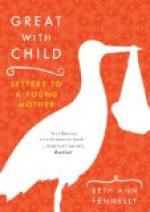Let me be distinctly understood as utterly opposed, not only to go-carts, leading strings, and every other mechanical contrivance, to induce children to walk before their legs are fit for it, but to efforts of every kind, whose main object is the same. Teaching them to walk by taking hold of one of their hands, is in some respects quite as bad as any other mode; for if the child should fall while we have hold of his hand, there is some danger of dislocating or otherwise injuring the limb.
Falls we must expect; but if a child is left to his own voluntary efforts as much as possible, these falls will be fewer, and probably less serious, than under any other circumstances.
SEC. 4. Walking.
“The way to learn how to write without ruled lines, is to rule,” was the frequent saying of an old schoolmaster whom I once knew; and I may say with as much confidence and with more truth, that “the way for a child to learn to walk alone, is to hold by things.”
I have anticipated, in previous pages, much of what might have otherwise been contained in this section. A few additional remarks are all that will be necessary.
At first, the nursery will be quite large enough for our young pedestrian. Much time should elapse before he is permitted to go abroad, upon the green grass;—not lest the air should reach him, or the sun shine upon his face and hands, but because the surface of the ground is so much less firm and regular than the floor, that he ought to be quite familiar with walking on the latter, in the first place.
But when he can walk well in the play ground, garden, fields, and roads, it is highly desirable that he should go out more or less every day, when the weather will possibly admit; nor would I be so fearful as many are of a drop of rain or dew, or a breath of wind. For say what they will in favor of riding, sailing, and other modes of exercise, there is none equal to walking, as soon as a child is able;—none so natural—none, in ordinary cases, so salutary. I know it is unpopular, and therefore our young master or young miss must be hoisted into a carriage, or upon the back of a horse, to the manifest danger of health or limbs, or both.
Who of us ever knew a herdsman or a shepherd who found it for the health and well-being of the young calf or lamb to hoist it into a carriage, and carry it through the streets, instead of suffering it to walk? Such a thing would excite astonishment; and the man who should do it would be deemed insane. The health and growth of our young domestic animals is best promoted by suffering them to walk, run, and skip in their own way. They ask no artificial legs, or horses, or carriages. But would it not be difficult to find arguments in favor of carrying children about, when they are able to walk, which would not be equally strong in favor of carrying about lambs and calves and pigs.




